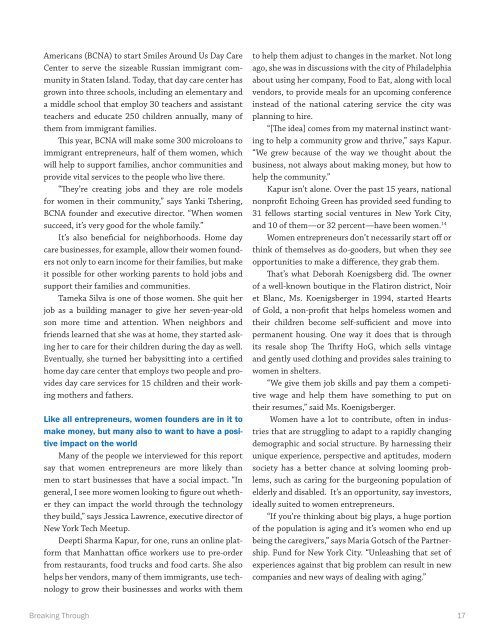BREAKING THROUGH
YWkgl
YWkgl
Create successful ePaper yourself
Turn your PDF publications into a flip-book with our unique Google optimized e-Paper software.
Americans (BCNA) to start Smiles Around Us Day Care<br />
Center to serve the sizeable Russian immigrant community<br />
in Staten Island. Today, that day care center has<br />
grown into three schools, including an elementary and<br />
a middle school that employ 30 teachers and assistant<br />
teachers and educate 250 children annually, many of<br />
them from immigrant families.<br />
This year, BCNA will make some 300 microloans to<br />
immigrant entrepreneurs, half of them women, which<br />
will help to support families, anchor communities and<br />
provide vital services to the people who live there.<br />
“They’re creating jobs and they are role models<br />
for women in their community,” says Yanki Tshering,<br />
BCNA founder and executive director. “When women<br />
succeed, it’s very good for the whole family.”<br />
It’s also beneficial for neighborhoods. Home day<br />
care businesses, for example, allow their women founders<br />
not only to earn income for their families, but make<br />
it possible for other working parents to hold jobs and<br />
support their families and communities.<br />
Tameka Silva is one of those women. She quit her<br />
job as a building manager to give her seven-year-old<br />
son more time and attention. When neighbors and<br />
friends learned that she was at home, they started asking<br />
her to care for their children during the day as well.<br />
Eventually, she turned her babysitting into a certified<br />
home day care center that employs two people and provides<br />
day care services for 15 children and their working<br />
mothers and fathers.<br />
Like all entrepreneurs, women founders are in it to<br />
make money, but many also to want to have a positive<br />
impact on the world<br />
Many of the people we interviewed for this report<br />
say that women entrepreneurs are more likely than<br />
men to start businesses that have a social impact. “In<br />
general, I see more women looking to figure out whether<br />
they can impact the world through the technology<br />
they build,” says Jessica Lawrence, executive director of<br />
New York Tech Meetup.<br />
Deepti Sharma Kapur, for one, runs an online platform<br />
that Manhattan office workers use to pre-order<br />
from restaurants, food trucks and food carts. She also<br />
helps her vendors, many of them immigrants, use technology<br />
to grow their businesses and works with them<br />
to help them adjust to changes in the market. Not long<br />
ago, she was in discussions with the city of Philadelphia<br />
about using her company, Food to Eat, along with local<br />
vendors, to provide meals for an upcoming conference<br />
instead of the national catering service the city was<br />
planning to hire.<br />
“[The idea] comes from my maternal instinct wanting<br />
to help a community grow and thrive,” says Kapur.<br />
“We grew because of the way we thought about the<br />
business, not always about making money, but how to<br />
help the community.”<br />
Kapur isn’t alone. Over the past 15 years, national<br />
nonprofit Echoing Green has provided seed funding to<br />
31 fellows starting social ventures in New York City,<br />
and 10 of them—or 32 percent—have been women. 14<br />
Women entrepreneurs don’t necessarily start off or<br />
think of themselves as do-gooders, but when they see<br />
opportunities to make a difference, they grab them.<br />
That’s what Deborah Koenigsberg did. The owner<br />
of a well-known boutique in the Flatiron district, Noir<br />
et Blanc, Ms. Koenigsberger in 1994, started Hearts<br />
of Gold, a non-profit that helps homeless women and<br />
their children become self-sufficient and move into<br />
permanent housing. One way it does that is through<br />
its resale shop The Thrifty HoG, which sells vintage<br />
and gently used clothing and provides sales training to<br />
women in shelters.<br />
“We give them job skills and pay them a competitive<br />
wage and help them have something to put on<br />
their resumes,” said Ms. Koenigsberger.<br />
Women have a lot to contribute, often in industries<br />
that are struggling to adapt to a rapidly changing<br />
demographic and social structure. By harnessing their<br />
unique experience, perspective and aptitudes, modern<br />
society has a better chance at solving looming problems,<br />
such as caring for the burgeoning population of<br />
elderly and disabled. It’s an opportunity, say investors,<br />
ideally suited to women entrepreneurs.<br />
“If you’re thinking about big plays, a huge portion<br />
of the population is aging and it’s women who end up<br />
being the caregivers,” says Maria Gotsch of the Partnership.<br />
Fund for New York City. “Unleashing that set of<br />
experiences against that big problem can result in new<br />
companies and new ways of dealing with aging.”<br />
Breaking Through 17


